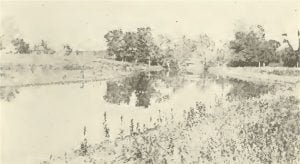Mr. Charles N. Phillips came with his wife from Pennsylvania, in 1871, leaving there on April 23, and arriving near Exeter on the first day of June. He filed on section 24, town 8, range 2, and had only $10 in money with which to start this new life. A sod house was built, not an inch of lumber being used, and in this rude dwelling they lived until money was forthcoming with which to buy some lumber. Those were trying days with bard experiences, but somehow things would work to their advantage at least to enable them to secure food. Mr. Phillips remembers well his going to the Smith Store with his watch to secure some groceries, money, there was none, and the watch might act as security for the goods until he could pay for them. On making his request known, Mrs. Smith who at the time was serving in the Store, said: he might have some goods without leaving the watch, he would need that! She knew the goods would be paid for as soon as possible. This was a kindness in the hour of need which he will never forget, and for which he was very grateful.
Those were days when they had to grind corn in a Coffee Mill that they might have flour, and the corn had to be bought at Lincoln.
The first winter was a severe one, he would often make a start towards the Blue river in search of firewood but was glad to turn back, the cold being too intense for such an undertaking. The snow storm of 1873 is very prominent in his mind, many during that storm were unable to leave their barns, however much they desired to be in the house. His barn was filled with the snow which had made its way through cracks and crevices. He had also to sweep the snow out of the house in the morning before he could get the fire lighted.
During the first summer, droves of Texas cattle used to pass over the prairies going to Fremont for shipment. One day Mrs. Phillips had set out afoot to visit the Rice’s home, a distance of about five miles, when she was unexpectedly surrounded by one of these large droves of cattle, she had never felt so uncomfortable in her life, but she managed to get out unharmed, it was, nevertheless a grand sight to see those cattle passing over the prairie.
In the following year the rains were so heavy as to make the Indian Creek overflow its banks, the flood washing out the B. & M. railroad bridge.
It was in this year they had their first experience of a prairie fire, it looked as though the Whole world was on fire, Mrs. Phillips ran for safety to a breaking, carrying the baby on her arm and in the excitement lost one of its shoes, strange to say Mr. Phillips found the shoe some time afterwards when breaking up the prairie.
Mr. Phillips thrashed wheat early in 1872, and as a result sold the first load of wheat ever sold in Exeter, (Spring wheat was the usual crop then) It was purchased by Mr. Dolan, and it was the first load of wheat he ever bought.
They had the usual calls from the Indians, but never suffered any loss as a result of their visits, like other settlers they lost their crops through the grasshoppers, and shared in the disadvantages of opening up a new Country, yet with it all they were happy.
It is interesting to note that Mr. Phillips, on coming here had but one arm, having lost the right arm in the Battle of Gettysburg, on July 1st, 1863. When attending the great Reunion on that historic Battlefield in 1913, he met a Confederate Soldier who lost his left arm on the same day in the same battle, thus those two, who fifty years before had fought each other, met in peaceful union, commemorating’ the event by having their pictures taken standing side by side.


Source: Pioneer Stories of the Pioneers of Fillmore and adjoining Counties, by G. R. McKeith, Press of Fillmore County News, Exeter, Nebraska, 1915.
Discover more from Nebraska Genealogy
Subscribe to get the latest posts sent to your email.
